| |  | | | |
The Satan Sandwich
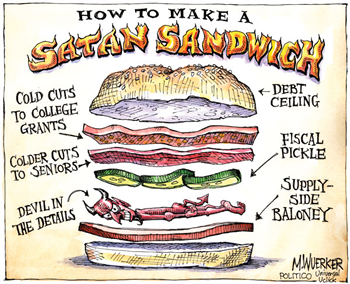
Friends, you have by now heard the phrase 'satan sandwich' a bit more often than you had heard it mentioned before. Let me say that I will call a Satan Sandwich like I see it, but I will never call another person by that name. This cartoon by Matt Wuerker says it better than I could. This debt deal was a terrible deal, without balance or real compromise. Democrats got nothing in this deal, but what truly troubles me is that the American people got less than nothing. I still believe that the budget of the United States is a moral document; it should reflect our commitment to protect the poor and the middle-class, defend our commitments to seniors, and make wise investments to create good jobs and strengthen our economy.
Democracy demands compromise. In this deal, some were willing to compromise, some were willing to allow default merely to prove a point. Still, I was not willing to see the economy fall into an abyss. The point I am attempting to make, perhaps poorly, is that I would never have allowed our country to fall into default on our bills and obligations. My vote was not needed to prevent this calamity, and my commitment to all of those I represent compelled me to vote against such an unfair, one sided measure, void of any compromise and balance.
I could not bring myself to vote for the so-called "Budget Control Act" that passed the House and Senate, and that was later signed into law by President Obama. I remain concerned about the extent of the cuts, the absence of revenue enhancements, the triggers, and the exclusivity of this so-called ‘super congress'. Most of all, I am concerned about how few have made decisions that will affect the lives of so many. The phone calls, e-mails, faxes, Facebook messages, and tweets you shared with me told me what we really needed was a bipartisan, balanced agreement, with both spending cuts and revenue increases to reduce the deficit and rebuild our economy.
For more information on the Budget Control Act, and a timeline of its implementation, please click here.
A Call to Action from Faithful America
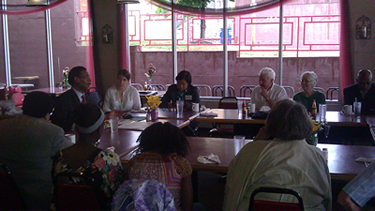 | | Congressman Cleaver discusses a moral budget over breakfast with people of faith. |
This morning, over breakfast at Papa Lew's, I had the pleasure of meeting with members of Faithful America, a group made up of tens of thousands of citizens motivated by faith to take action on the pressing moral issues of our time. As it happened, I happened to see quite a few familiar faces around the table this morning. The goals of Faithful America are to end poverty and promote economic security for all, promote peace and restore America's commitment to human rights and diplomacy, prevent the catastrophic effects of climate change, counter hate speech and misinformation in the media pertaining to people of faith, and work for welcoming communities where immigrants and people of all faiths are welcome. Quite a cause, and one I am proud to have spent much of my life working toward as well.
Labor Leaders
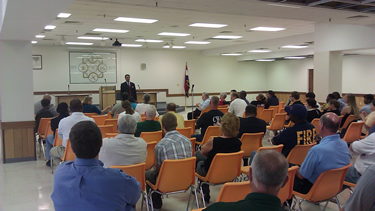 | | Congressman Cleaver speaks at the Plumbers and Pipefitters Union Hall, to local labor union leaders. |
In Washington these past few weeks, all we seemed to talk about was the debt crisis, the debt deal, the debt ceiling, defaulting on the debt. The roar of the Washington echo chamber seemed almost deafening.
But what I have found, time and time again, is that my constituents, and all Americans, want to focus on jobs. Job creation is still below a level necessary to bring the unemployment rate down in any real way, and the manufacturing index released earlier this week shows that the industry may face some tougher times in the months ahead. Some 25 million Americans are unemployed, underemployed or have stopped looking for work, and wages are essentially flat. Income inequality has soared over the past few decades. From 1973 to 2007, wage inequality in the private sector increased by more than 40 percent. Much of this, make no mistake, is due to deunionization. A recent study found that the decline in the power of organized labor has allowed income inequality to rise partly because unions are negotiating wages for fewer people than they used to, and partly because unions no longer have the power to force the political system to pay attention to the needs of the middle class.
Who is paying attention to the middle class? I fear that many in Washington have forgotten. Despite all these problems, and all the people crying out for help, we passed a Budget Control bill that did nothing to address our continuing jobs crisis. The American people want us to focus on jobs. Some 56 percent of those surveyed in a recent poll say Congress and the president should work on jobs this year and 48 percent say those jobs should be in manufacturing., When asked whether Congress and the president should focus on the federal budget deficit or jobs, 67 percent say jobs.
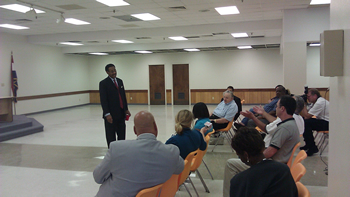 | | Fred Jonas, resident of Independence, Missouri asks Congressman Cleaver why, at a time when unemployment is at Depression-era levels, Congress has not brought a jobs bill to the Floor. |
This afternoon, I met with local labor leaders from the Fifth District. We talked about the debt ceiling, and why it makes no sense for us to include both revenues and spending cuts—not one or the other. We talked about the debt deal, the need to protect Social Security, Medicare, and Medicaid, the recent jobs numbers (more on that below), and what we can do to put people back to work. In the coming days, I will be traveling around the country to work on the CBC Jobs Initiative. I will bring the lessons I learn and the tools I find back to the Fifth District, to continue to rebuild our economy and create good, fair-paying jobs.
The Employment Situation in July
This report comes to you from Chad Stone, the Chief Economist of the Center on Budget and Policy Priorities. The Center on Budget and Policy Priorities is a nonprofit, nonpartisan research organization and policy institute that conducts research and analysis on a range of government policies and programs. It is supported primarily by foundation grants.
Today's jobs report shows that the labor market continues to limp along rather than put people back to work. The share of the population with a job remains severely depressed and unemployment remains alarmingly high — with more than 40 percent of the unemployment rate attributable to people who have been looking for work for six months or more (see chart). This situation screams out for Congress to extend the federal emergency unemployment insurance (UI) programs scheduled to expire at the end of this year, and for Congress and the Federal Reserve to consider further measures to boost the flagging recovery.
Last week's report on gross domestic product (GDP) showed the recession was much deeper than previously estimated and growth in the first half of this year was very weak. That helps explain why, despite two full years of economic growth and 17 straight months of private-sector job creation, we still have 6.8 million fewer jobs than at the start of the recession and the unemployment rate remains 4.1 percentage points higher. The economy fell into a very deep hole and has been climbing out very slowly.
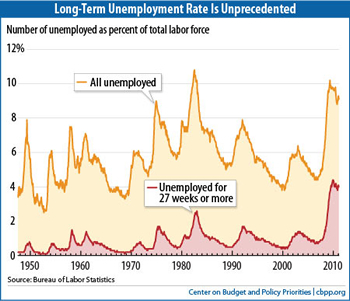
The hole would have been even deeper without the Recovery Act measures that President Obama and Congress enacted in early 2009. The Congressional Budget Office (CBO) estimates that those measures boosted GDP by between 1.5 and 4.2 percent in 2010 and lowered the unemployment rate by between 0.7 and 1.8 percentage points. The phaseout of those measures, however, is now exerting a drag on the recovery, and the scheduled expiration at the end of this year of last December's payroll tax cut and extension of federal emergency UI benefits will add to that drag.
This week's debt limit deal did nothing to give the recovery a needed short-run boost before longer-term deficit reduction kicks in. Lawmakers can start to remedy that and provide needed support to workers who exhaust their 26 weeks of regular UI benefits before finding work by extending federal UI benefits for another year. CBO and other analysts rank unemployment insurance payments as among the most effective forms of job-creating stimulus in a weak economy. Additional temporary measures, such as extending the payroll tax cut, would provide a further boost to the recovery without jeopardizing longer-term deficit reduction.
About the July Jobs Report
Job growth increased modestly in July, but the labor market remains in a deep slump. - Private and government payrolls rose by just 117,000 jobs in July. Private employers on net added 154,000 jobs, while state government employment fell by 23,000 jobs (almost entirely due to the shutdown of the Minnesota state government) and local government employment fell by 16,000 jobs (federal government employment rose by 2,000).
- This is the 17th straight month of private-sector job creation, with payrolls growing by 2.4 million jobs (a pace of 140,000 jobs a month) since February 2010; total nonfarm employment (private plus government jobs) has grown by 1.9 million jobs over the same period, or 114,000 a month. Growth of 200,000 to 300,000 jobs a month or more is typical in strong economic recoveries, so the modest pace of just 72,000 jobs per month over the last three months is very disappointing.
- In July, despite 17 months of private-sector job growth, there were still 6.8 million fewer jobs on nonfarm payrolls than when the recession began in December 2007, and 6.5 million fewer jobs on private payrolls.
- The unemployment rate edged down from 9.2 percent to 9.1 percent in July, and the number of unemployed edged down to 13.9 million. The unemployment rate was 8.1 percent for whites (3.7 percentage points higher than at the start of the recession), 15.9 percent for African Americans (6.9 percentage points higher than at the start of the recession), and 11.3 percent for Hispanics or Latinos (5.0 percentage points higher than at the start of the recession).
- The recession and lack of job opportunities drove many people out of the labor force, and we have yet to see the return to labor force participation (people working or actively looking for work) that marks a strong jobs recovery. In July, the labor force declined by 193,000 people, contributing to the drop in the unemployment rate. The labor force participation rate (the share of the population aged 16 and over working or looking for work) is the lowest it has been since 1984. It dropped to 63.9 percent in July, the first time it has been below 64 percent since May 1983. So far this year, labor force growth has hardly even kept up with population growth and many potential workers remain on the sidelines while job prospects remain weak.
- The share of the population with a job, which plummeted in the recession from 62.7 percent in December 2007 to levels last seen in the mid-1980s, fell to 58.1 percent in July, a low not seen since July 1983, and has not been above 58.5 percent in 14 months.
- It remains very difficult to find a job. The Labor Department's most comprehensive alternative unemployment rate measure — which includes people who want to work but are discouraged from looking and people working part time because they can't find full-time jobs — was 16.1 percent in July, not much below its all-time high of 17.4 percent in October 2009 in data that go back to 1994. By that measure, more than 25 million people are unemployed or underemployed.
- Long-term unemployment remains a significant concern. Over two-fifths (44.4 percent) of the 13.9 million people who are unemployed — 6.2 million people — have been looking for work for 27 weeks or longer. These long-term unemployed represent 4.0 percent of the labor force. Prior to this recession, the previous highs for these statistics over the past six decades were 26.0 percent and 2.6 percent, respectively, in June 1983.
|
Follow me on Twitter!
You can now follow me @repcleaver. As always, I look forward to hearing from you.
Click here to add me >>> https://twitter.com/repcleaver

Emanuel Cleaver, II
Member of Congress
| |
|
|  |
| Kansas City Office
101 W 31st St.
Kansas City, MO 64108
Phone: 816-842-4545
Fax: 816-471-5215 | Independence Office
211 West Maple Avenue
Independence, MO 64050
Phone: 816-833-4545
Fax: 816-833-2991 | Washington Office
1433 Longworth HOB
Washington, D.C. 20515
Phone: 202-225-4535
Fax: 202-225-4403
|
|
|
| |
| | |
|